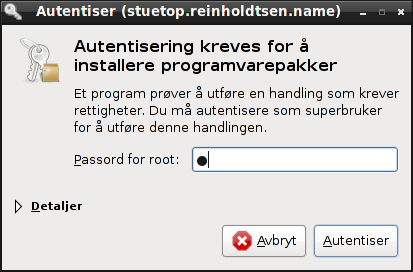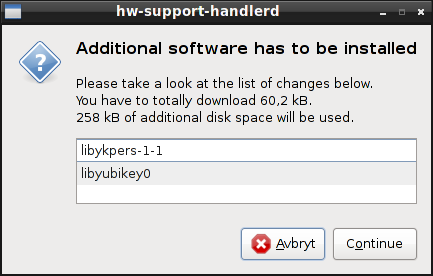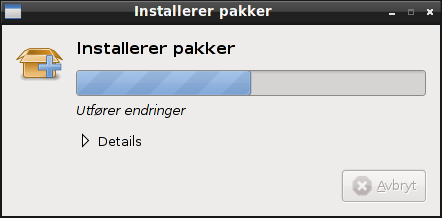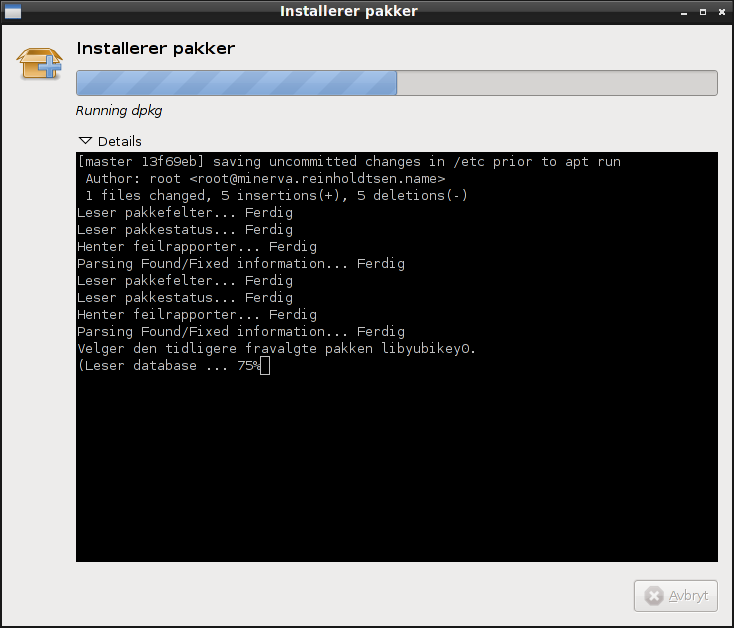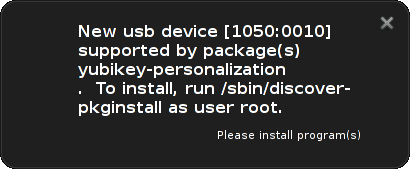While looking into how to look up Debian packages based on hardware
information, to find the packages that support a given piece of
hardware, I refreshed my memory regarding modalias values, and decided
to document the details. Here are my findings so far, also available
in
the
Debian Edu subversion repository:
Modalias decoded
This document try to explain what the different types of modalias
values stands for. It is in part based on information from
<URL: https://wiki.archlinux.org/index.php/Modalias >,
<URL: http://unix.stackexchange.com/questions/26132/how-to-assign-usb-driver-to-device >,
<URL: http://code.metager.de/source/history/linux/stable/scripts/mod/file2alias.c > and
<URL: http://cvs.savannah.gnu.org/viewvc/dmidecode/dmidecode.c?root=dmidecode&view=markup >.
The modalias entries for a given Linux machine can be found using
this shell script:
find /sys -name modalias -print0 | xargs -0 cat | sort -u
The supported modalias globs for a given kernel module can be found
using modinfo:
% /sbin/modinfo psmouse | grep alias:
alias: serio:ty05pr*id*ex*
alias: serio:ty01pr*id*ex*
%
PCI subtype
A typical PCI entry can look like this. This is an Intel Host
Bridge memory controller:
pci:v00008086d00002770sv00001028sd000001ADbc06sc00i00
This represent these values:
v 00008086 (vendor)
d 00002770 (device)
sv 00001028 (subvendor)
sd 000001AD (subdevice)
bc 06 (bus class)
sc 00 (bus subclass)
i 00 (interface)
The vendor/device values are the same values outputted from 'lspci
-n' as 8086:2770. The bus class/subclass is also shown by lspci as
0600. The 0600 class is a host bridge. Other useful bus values are
0300 (VGA compatible card) and 0200 (Ethernet controller).
Not sure how to figure out the interface value, nor what it
means.
USB subtype
Some typical USB entries can look like this. This is an internal
USB hub in a laptop:
usb:v1D6Bp0001d0206dc09dsc00dp00ic09isc00ip00
Here is the values included in this alias:
v 1D6B (device vendor)
p 0001 (device product)
d 0206 (bcddevice)
dc 09 (device class)
dsc 00 (device subclass)
dp 00 (device protocol)
ic 09 (interface class)
isc 00 (interface subclass)
ip 00 (interface protocol)
The 0900 device class/subclass means hub. Some times the relevant
class is in the interface class section. For a simple USB web camera,
these alias entries show up:
usb:v0AC8p3420d5000dcEFdsc02dp01ic01isc01ip00
usb:v0AC8p3420d5000dcEFdsc02dp01ic01isc02ip00
usb:v0AC8p3420d5000dcEFdsc02dp01ic0Eisc01ip00
usb:v0AC8p3420d5000dcEFdsc02dp01ic0Eisc02ip00
Interface class 0E01 is video control, 0E02 is video streaming (aka
camera), 0101 is audio control device and 0102 is audio streaming (aka
microphone). Thus this is a camera with microphone included.
ACPI subtype
The ACPI type is used for several non-PCI/USB stuff. This is an IR
receiver in a Thinkpad X40:
acpi:IBM0071:PNP0511:
The values between the colons are IDs.
DMI subtype
The DMI table contain lots of information about the computer case
and model. This is an entry for a IBM Thinkpad X40, fetched from
/sys/devices/virtual/dmi/id/modalias:
dmi:bvnIBM:bvr1UETB6WW(1.66):bd06/15/2005:svnIBM:pn2371H4G:pvrThinkPadX40:rvnIBM:rn2371H4G:rvrNotAvailable:cvnIBM:ct10:cvrNotAvailable:
The values present are
bvn IBM (BIOS vendor)
bvr 1UETB6WW(1.66) (BIOS version)
bd 06/15/2005 (BIOS date)
svn IBM (system vendor)
pn 2371H4G (product name)
pvr ThinkPadX40 (product version)
rvn IBM (board vendor)
rn 2371H4G (board name)
rvr NotAvailable (board version)
cvn IBM (chassis vendor)
ct 10 (chassis type)
cvr NotAvailable (chassis version)
The chassis type 10 is Notebook. Other interesting values can be
found in the dmidecode source:
3 Desktop
4 Low Profile Desktop
5 Pizza Box
6 Mini Tower
7 Tower
8 Portable
9 Laptop
10 Notebook
11 Hand Held
12 Docking Station
13 All In One
14 Sub Notebook
15 Space-saving
16 Lunch Box
17 Main Server Chassis
18 Expansion Chassis
19 Sub Chassis
20 Bus Expansion Chassis
21 Peripheral Chassis
22 RAID Chassis
23 Rack Mount Chassis
24 Sealed-case PC
25 Multi-system
26 CompactPCI
27 AdvancedTCA
28 Blade
29 Blade Enclosing
The chassis type values are not always accurately set in the DMI
table. For example my home server is a tower, but the DMI modalias
claim it is a desktop.
SerIO subtype
This type is used for PS/2 mouse plugs. One example is from my
test machine:
serio:ty01pr00id00ex00
The values present are
ty 01 (type)
pr 00 (prototype)
id 00 (id)
ex 00 (extra)
This type is supported by the psmouse driver. I am not sure what
the valid values are.
Other subtypes
There are heaps of other modalias subtypes according to
file2alias.c. There is the rest of the list from that source: amba,
ap, bcma, ccw, css, eisa, hid, i2c, ieee1394, input, ipack, isapnp,
mdio, of, parisc, pcmcia, platform, scsi, sdio, spi, ssb, vio, virtio,
vmbus, x86cpu and zorro. I did not spend time documenting all of
these, as they do not seem relevant for my intended use with mapping
hardware to packages when new stuff is inserted during run time.
Looking up kernel modules using modalias values
To check which kernel modules provide support for a given modalias,
one can use the following shell script:
for id in $(find /sys -name modalias -print0 | xargs -0 cat | sort -u); do \
echo "$id" ; \
/sbin/modprobe --show-depends "$id"|sed 's/^/ /' ; \
done
The output can look like this (only the first few entries as the
list is very long on my test machine):
acpi:ACPI0003:
insmod /lib/modules/2.6.32-5-686/kernel/drivers/acpi/ac.ko
acpi:device:
FATAL: Module acpi:device: not found.
acpi:IBM0068:
insmod /lib/modules/2.6.32-5-686/kernel/drivers/char/nvram.ko
insmod /lib/modules/2.6.32-5-686/kernel/drivers/leds/led-class.ko
insmod /lib/modules/2.6.32-5-686/kernel/net/rfkill/rfkill.ko
insmod /lib/modules/2.6.32-5-686/kernel/drivers/platform/x86/thinkpad_acpi.ko
acpi:IBM0071:PNP0511:
insmod /lib/modules/2.6.32-5-686/kernel/lib/crc-ccitt.ko
insmod /lib/modules/2.6.32-5-686/kernel/net/irda/irda.ko
insmod /lib/modules/2.6.32-5-686/kernel/drivers/net/irda/nsc-ircc.ko
[...]
If you want to help implementing a system to let us propose what
packages to install when new hardware is plugged into a Debian
machine, please send me an email or talk to me on
#debian-devel.
Update 2013-01-15: Rewrite "cat $(find ...)" to
"find ... -print0 | xargs -0 cat" to make sure it handle directories
in /sys/ with space in them.

